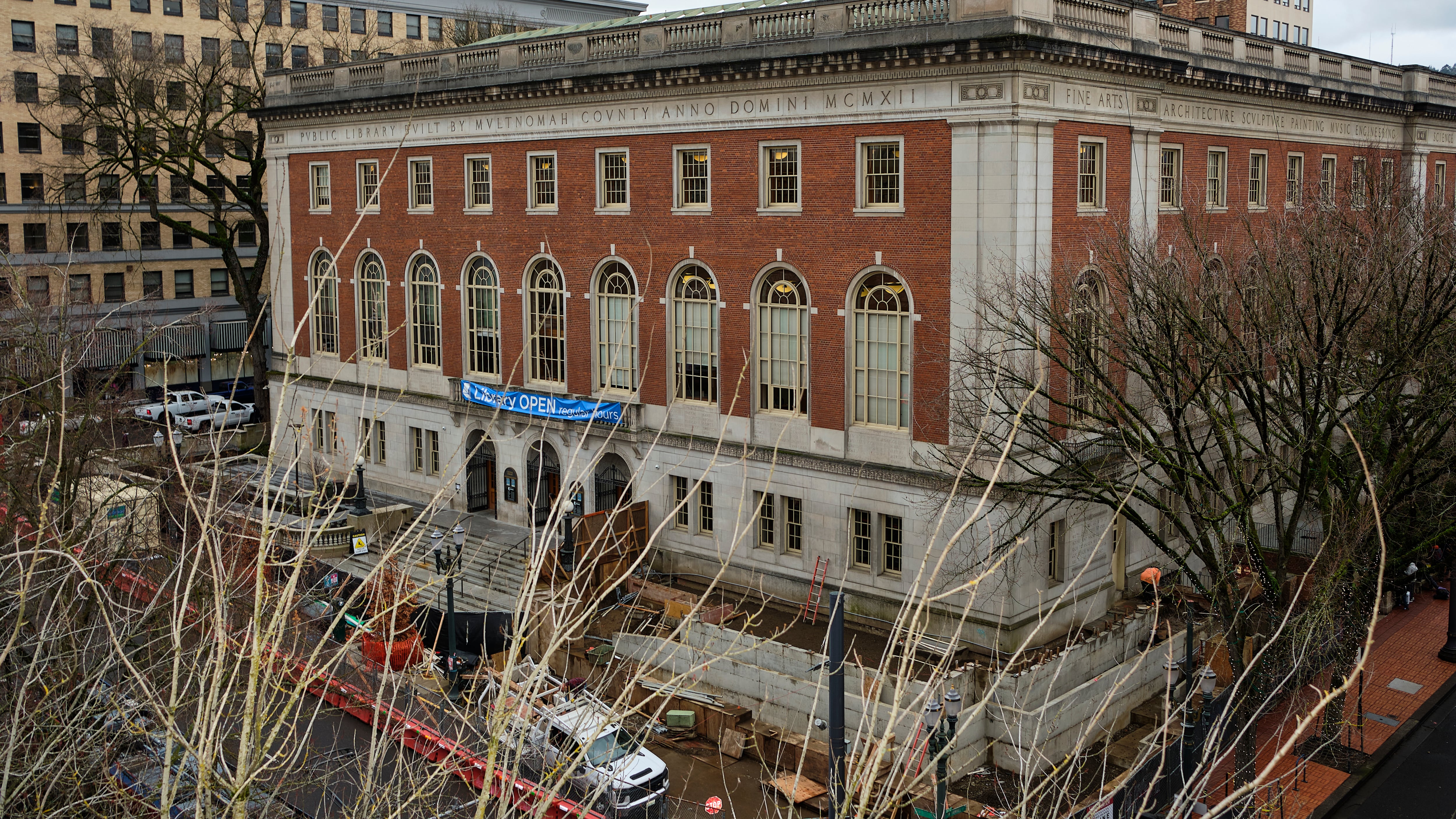Shootings, even mass ones, don’t generate much debate in America anymore. Likewise, unless there are multiple victims, individual acts of gun violence often fail to engage Portland leaders.
The July 1 killing of Douglas Ivers, 50, appears to be different, and it proves that location is everything. Ivers was shot in front of Multnomah County’s Central Library, which takes up a full downtown block on Southwest 10th Avenue between Yamhill and Taylor streets.
Ivers’ death, allegedly at the hands of Hassan Mohamed Muse, 26 (who called himself “Alpha Albiathar” at a July 14 hearing), has pitted public officials against one another as they seek to prevent more violence. In addition to small questions about who should patrol the library—private security, police or the county sheriff—the broad-daylight shooting has raised bigger ones about whether public spaces should be made less public.
The library system is run by Multnomah County, but the land beneath the Central Library is owned by the city of Portland, which also controls the police. Thanks to that overlap, the Ivers shooting has prompted a fight that looks—in miniature—like the yearslong battle between the city and county over who is supposed to do what about homelessness.
Angry letters have been flying back and forth across the river between City Hall and Multnomah County headquarters since the shooting. County Commissioner Meghan Moyer let rip recently, disputing recommendations by the Portland Police Bureau on how the county, as administrator of the library, should secure it.
“The assailant and victim came into contact outside the library, on the city’s sidewalk, and the fight spilled into the city’s streets resulting in a fatality,” Moyer wrote in a letter to Mayor Keith Wilson and Police Chief Bob Day on July 25. “Multnomah County library staff and security do not have the authority or resources to police sidewalks and streets that belong to the city of Portland.”
That same day, Mayor Keith Wilson chimed in to back up his cops.
“The Portland Police Bureau has provided a list of basic, common-sense security recommendations,” Wilson wrote to Moyer. “It is clear that restoring safety to Multnomah County Central Library is within the power of Multnomah County leadership.”
The story behind the gunshot that’s ricocheting around Portland local government begins long before Muse, who has pleaded not guilty, allegedly left the library and followed Ivers. Emails show that the Portland Metro Chamber (the local chamber of commerce) and Downtown Portland Clean & Safe (a security offshoot of the Metro Chamber) have been pressing for more patrols around the Central Library since at least October 2024.
Like many neighborhood groups in Portland, Clean & Safe hires private security to patrol downtown. Most recently, it’s been using St. Louis-based GardaWorld Security. In a March 10 email to Steve Wytcherley, director of operations at Clean & Safe, GardaWord account manager Kevin McGraham described how Case Study Coffee, Virginia Cafe and other local businesses had complained about drug dealing and property damage outside the library.
In response, GardaWorld added extra patrols around the library. It worked, McGraham wrote, and the library system’s security manager reached out for tips regarding GardaWorld’s strategies, which McGraham described as “more effective” than those used by the library’s security company, Inter-Con Security.
But Inter-Con didn’t take GardaWorld’s advice, McGraham wrote. “The contracted security team at the library hasn’t changed any of the recommendations that were given, and I believe will still have issues controlling the area.”
His words proved prescient. On May 14, Clean & Safe employees saw a man take off his belt and whip a woman about the head with it while she sat on a bench near the library. They called police, who learned that the man had made sexually graphic comments to another woman and tried to grab her leg, according to KATU-TV, which reported on the episode at the time.
Six days later, Portland Metro Chamber president Andrew Hoan wrote to Multnomah County Library director Annie Lewis and Jenny Smith, chief of staff to County Chair Jessica Vega Pederson, directing them to a story about the attack.
“Conditions have not improved at the library, and if anything, they have worsened,” Hoan wrote May 20, proposing a meeting with law enforcement and the county to tackle the problem. “It’s imperative that we move forward before more and more serious incidents arise.”
A draft of the county’s Safe Summer Activation Plan, aimed at making the Central Library and the block around it safe during warmer weather, failed to impress the Metro Chamber. After reviewing it, Hoan and his team sent a list of demands. They wanted more collaboration between the county and the cops, zero tolerance for drug use and possession, and a permanent guard at the entrance to the library, according to the list sent by Hoan on June 16. They also wanted all behavioral health services, funded by Metro’s supportive housing services tax, removed from the library.
“We request that the library administration emphasize its basic, core services and allow other county departments to administer homeless services,” Hoan at the Metro Chamber wrote.
Fifteen days later, Hassan Muse followed Douglas Ivers out of the library and away from the building, arguing with him, according to an eyewitness account and video footage described in court documents. Ivers brandished a can of bear spray, and Muse backed off. The documents say Ivers turned away and Muse took out a semiautomatic pistol from a green reusable grocery bag and shot Ivers, who dropped to the ground face down. Muse shot him again, records say, before walking north “casually.”
Six days after the incident, the Portland Police Bureau sent out a list of “security and safety recommendations for the Central Library,” tying the crime to the place. Among them: consider returning security oversight to the Multnomah County sheriff; install metal detectors at the library entrance; require library users to obtain an annual membership; and disable the library’s exterior Wi-Fi signal, which “served a purpose during the COVID era” but now draws “individuals with no intent to use library services.”
The library took some of the advice. It turned off Wi-Fi after hours and plans to remove some outdoor benches, which the Police Bureau said were used “almost exclusively for open fentanyl use and loitering.”

In an interview last week, Commissioner Moyer said she “empathizes totally” with businesses neighboring the library. But the notion that the county wasn’t collaborating with police was “100% ludicrous.”
“We are openly asking for the Portland police to be more engaged around Central Library,” Moyer said. “I don’t know how much more clear we can make that.”
Rather than turn security over to the sheriff (at the county’s expense), Moyer said in her July 25 letter that Portland police should respond more often and more quickly when they get calls from library staff. “It is unacceptable that their calls for assistance in dealing with people brandishing weapons or using drugs on city property surrounding the library go unanswered,” she wrote.
Around the same time, the Police Bureau weighed in with a July 23 memo posted to its public records website, saying that stops by its officers in the area are up 218% from last year. This aimed to demonstrate the bureau’s increased intervention efforts.
“It is clear that the root of the problem lies in a place-based environment that is permissive and inviting to illegal behavior,” the bureau wrote. “The current security posture at the Central Library lacks deterrence and accountability.”
Whatever happens, Moyer says the Multnomah County Central Library must feel like a library and not like a military outpost, with guards, gates and metal detectors.
“I do not want to turn Central Library into a fortress that is uninviting and intimidating,” Moyer says. “This is a wonderful place that nobody should feel afraid to be at. If you’ve not been to the downtown library since its remodel, come check it out. It’s beautiful.”

